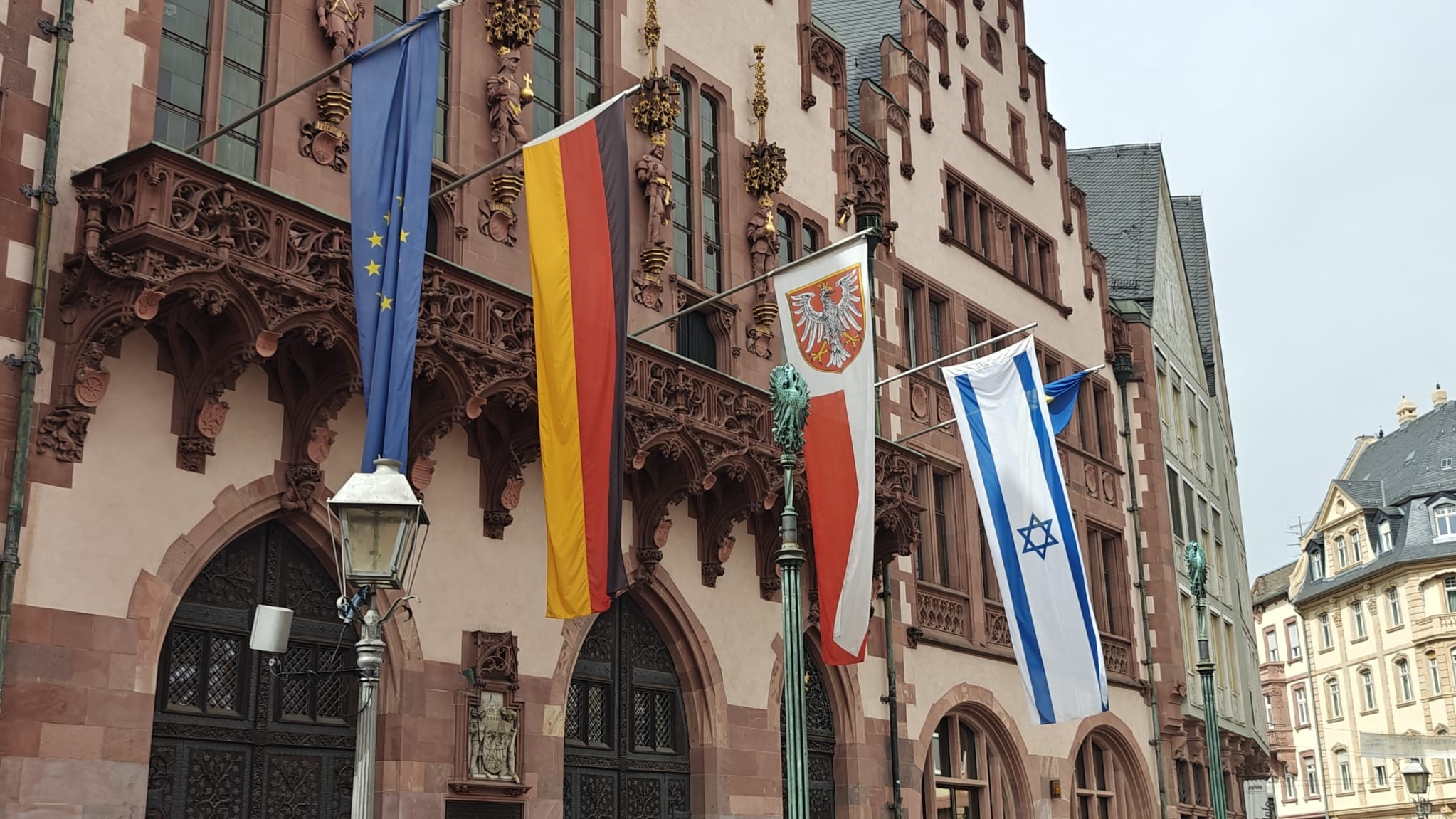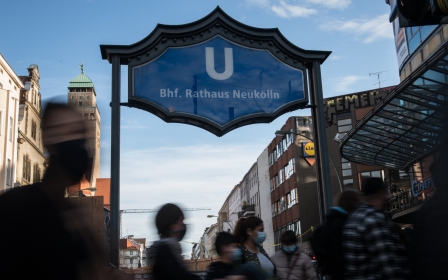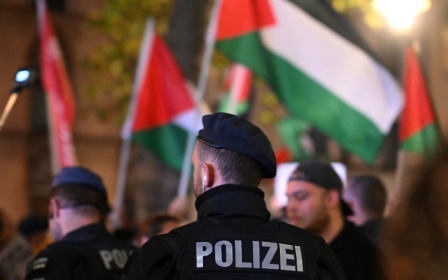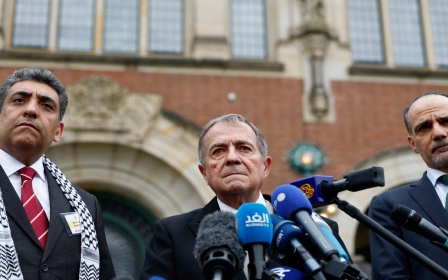Germany: A small cadre of politicians speaks out against Israel

Since the start of the war on Gaza, Germany has offered Israel unwavering support, refusing to condemn the atrocities committed in the besieged enclave even as other western allies, including the US, have become increasingly vocal against its military conduct.
In October, during an address to the Bundestag, the German parliament, Chancellor Olaf Scholz declared: "At this moment, there is only one place for Germany. That is [at] the side of Israel. That's what we mean when we say, Israel's security is German Staatsrason [reason of state]."
Politicians from across the political spectrum have also pledged unwavering support for Israel, promising that Germany "stands firmly at the side of Israel".
The phrase that Israel is Germany's "reason of state" originates from a 2008 Knesset speech by former chancellor Angela Merkel and has been repeated several times over the past months by German public officials following the Hamas-led attack on Israel on 7 October.
That solidarity has persisted throughout the now six-month long campaign, in which Israel has been accused of war crimes and faces charges of genocide at the International Court of Justice (ICJ) in The Hague.
New MEE newsletter: Jerusalem Dispatch
Sign up to get the latest insights and analysis on Israel-Palestine, alongside Turkey Unpacked and other MEE newsletters
Given that widespread international condemnation, Israel's backers have faced pressure to withhold support for the state.
While several governments, including Canada and the Netherlands, have suspended arms exports to Israel, Germany has nevertheless increased them nearly 10-fold.
The value of German arms exports amounted to 32m euros ($34.7m) in 2022. By November 2023, they had increased to 303m euros. The majority of that increase came after the start of the war. German arms exports amount to 30 percent of worldwide arms sales to Israel.
Such is the level of support in Germany for Israel that Berlin faces accusations of complicity in Israel's war crimes.
At the time of the publication of this article, Germany is facing charges filed by Nicaragua at the ICJ for facilitating Israel's "genocide" in Gaza.
More than 33,600 Palestinians have been killed and at least 76,309 wounded in Israeli attacks, which have also caused widespread destruction across all of Gaza on a scale not seen in other recent conflicts.
While Berlin's tone on Israel has reportedly become increasingly critical in recent weeks, public opposition to Germany's Israel policy and critical statements on the Gaza conflict amongst German public officials remain surprisingly minimal.
On a national level, left-wing politician Sahra Wagenknecht and her supporters in the Bundestag have been most vocal, calling for an immediate arms embargo against Israel.
"The deaths in Gaza and Israel's attacks in neighbouring countries must end immediately," Wagenknecht said on 2 April.
Her party colleague and member of the Bundestag, Sevim Dagdelen, currently in the Hague as a parliamentary observer for Germany's hearing at the ICJ, told Middle East Eye in a written statement, that: "Germany must immediately and independently of the ICJ hearing halt all weapons exports to Israel. International humanitarian law must always be given greater weight than self-defence."
Israel flags at German city halls
On a local level, several politicians in various German municipalities have taken steps to try to have their criticism of Israel matched with action.
Haluk Yildiz is one of them. The federal chairman of the Alliance for Innovation and Justice (BIG) party and member of Frankfurt's city council, Yildiz filed a request to remove the Israeli flag in front of Frankfurt's city hall during Ramadan, the Muslim month of fasting which ended this week.
The flag was put up last October as a "sign of solidarity", but it is unclear who mandated the move, Yildiz noted.
"The flag of a country comitting a genocide is hanging from our city hall. How are the Muslims and especially the Palestinians in Frankfurt supposed to celebrate Ramadan in peace?", Yildiz told Middle East Eye.
Frankfurt, in Hesse state, has a Muslim population of between 100,000 and 150,000, making up nearly 15 percent of the city's population.
The motion Yildiz put forward was not even put on the agenda of Frankfurt's parliament. During a city council meeting, Yildiz requested to add the Palestinian flag to the city hall, citing an email request from a citizen.
"In questions of antisemitism, there are no two opinions", the mayor of Frankfurt, Mike Josef, said in reply to Yildiz's request.
'Politicians don't speak up because they don't want to ruin their careers. But I don't care. I am committed to the truth'
- Haluk Yildiz, member of Frankfurt's city council
For the first time this year, however, Frankfurt installed Ramadan lights in the city centre, following a request by city council member Omar Shehata.
"During my speech in defence of my request, I was interrupted several times. One of my colleagues shouted: 'Take off the terror-scarf'", Yildiz told Middle East Eye, who terminated his speech by raising the Palestinian flag.
His microphone was muted, and he was booed by other city council members.
In the first speech he gave on the topic in November, 60 percent of the city council's 93 members left the room, Yildiz said.
"Germany is silent and supplies weapons. Politicians don't speak up because they don't want to ruin their careers. But I don't care. I am committed to the truth", he said.
Yildiz and his party's next goal is to make it to the European parliament elections, to be held in June. Together with other like-minded parties across Europe, he wants to promote a 10-point plan to raise awareness about human rights violations in Palestine.
"It is feasible to get a seat, and even if its just one, we can change something", Yildiz told Middle East Eye.
'There's praise in the backroom'
His party colleague and city council member for Hesse state's capital Wiesbaden, Faisal Wardak, told Middle East Eye: "People are afraid of losing their job if they speak up."
Two weeks ago, Wardak filed a motion to review Wiesbaden's business ties with the building materials company HeidelbergMaterials, known for operating a large quarry near al-Zawiya village in the occupied West Bank through its wholly owned subsidiary Hanson Israel.
The mined mineral resources are brought to Israel and do not benefit the Palestinians, who are the rightful owners of the raw materials, according to international law.
In his motion, Wardak demanded the city of Wiesbaden reveal information pertaining to ongoing projects between the city and HeidelbergMaterials, whether it has awarded construction or supply contracts to HeidelbergMaterials and what guidelines Wiesbaden has put in place to ensure respect for international law.
"It's a shame that a German company extracts resources at the expense of Palestinians, at the expense of human rights," Wardak said during a speech in front of Wiesbaden's parliament on 21 March. "The central question is: do public funds go to companies like HeidelbergMaterials?"
'Behind closed doors, people tell me that what I am doing is brave and that they support it, but nobody dares to speak publicly. Only in the back room there is praise'
- Faisal Wardak, city council member in Wiesbaden
All parliamentary members, except for Wardak and his party colleague, voted against the motion and it was rejected.
In a video recording of the parliamentary session following the motion, Wiesbaden's mayor, Gert-Uwe Mende, replied to Wardak's speech by pointing out that, referring to the Palestinian-led Boycott Divestment and Sanctions movement, "the antisemitic organisation BDS supports claims against HeidelbergMaterials", discrediting Wardak's motion as "having nothing to do with the city's local politics".
"After that, there is not much more I could do. My hands are tied," he told Middle East Eye.
Four days after the motion was rejected, Israel's ambassador to Germany, Ron Prosor, visited Wiesbaden. "Hesse stands firmly on the side of Israel", the minister president of Hesse, Boris Rhein, stated.
But Wardak said things are different when it comes to private sentiment.
"Behind closed doors, many people come up to me and tell me that what I am doing is brave and that they support it, but nobody dares to speak publicly. Only in the back room there is praise", Wardak said.
"Others say: 'I can't change anything.' I don't believe that. You can see it with my example. Every voice counts, anybody can do something."
Middle East Eye delivers independent and unrivalled coverage and analysis of the Middle East, North Africa and beyond. To learn more about republishing this content and the associated fees, please fill out this form. More about MEE can be found here.




